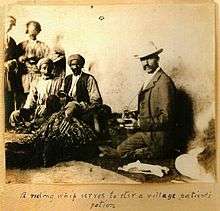Joseph Cochran

Joseph Plumb Cochran, M.D. (January 14, 1855, Urmia, Iran – August 18, 1905, Urmia, Iran), was an American Presbyterian missionary. He is credited as the founding father of Iran’s first modern Medical School.[1]
Personal Life
Joseph Cochran's father, the Reverend Joseph Gallup Cochran (1817-1871), and his mother, Deborah Wilber Plumb (1820-1893), were first-generation American missionaries who traveled to Iran in 1848. They settled in Urmia, Western Azarbaijan, Iran, home to the people of the ancient culture of Urartu and of one of the earliest Christian churches, the Assyrian Church of the East. The family devoted their missionary zeal to the well-being of the local population, many of whom were devout Christians.
The young Joseph was one of the eight children of Cochran's family. He had a happy childhood in the company of his large family and friends. He learnt the local Assyrian, Azerbaijani and Kurdish, in addition to English and Persian. He left for America as a teenager in 1868, staying in Buffalo, N.Y. with the family of Stephen Mallory Clement (1825-1892), who was to help finance not only Joseph Cochran's education, but also his hospital. He studied medicine at New York Medical College, from where he graduated in 1876. Subsequently he did two years of practical hospital work in surgery, infectious diseases and gynecology. During a travel to Minnesota he met his future wife, Katherine Hale.
Medical Career in Urmia

The young couple went to Iran in 1878. Upon their arrival in Urmia they surveyed the medical and health needs of the community and found the existing small health clinic, which was working under the auspices of the Iranian Red Lion and Sun Society, inadequate. On Joseph's earnest request, the Board of Assyrian Missionary purchased a 15-hectare garden which was soon to become the site of a 100-bed hospital, named Westminster Hospital, after the church in Buffalo, N.Y. that was the vehicle for supporting Dr. Cochran's work. The building of this hospital was completed within one year from its original planning and the hospital opened its doors in 1879.
Cochran resolved the problem of shortage in the local medical professionals by establishing a modern Medical School, the first of its kind in Iran. For this purpose he erected a wooden building, which included a research laboratory, near the hospital, where the future medical personnel were to be trained. Remarkably, this original wooden building, near the present-day Urmia Medical School, is still intact. An adjoining maternity hospital was built later, for which the required medical equipment arrived from America.
According to the information provided by the official website of Urmia University,[2] Joseph Cochran has been [the first] director of the Medical School in Urmia, established in 1878. In the course of Cochran's 27 years of directorship, 26 medical students graduated from this School. This School was closed on Joseph Cochran's death in 1905 and remained in this state until sixty years later when it was opened as one of several Schools of Urmia University. The historical archives of Urmia University is in the possession of documents that show that Mozaffar al-Din Shah Qajar and Joseph Cochran have personally signed and handed certificates to graduating students during the graduation ceremony of 1898 (1277 AH).
During the above-mentioned period, Joseph Cochran was joined by other American medical doctors, including Dr Wright, Dr Homlz, Dr van Norden, and Dr Miller, who remained permanently in Iran.[3] Their resting places are in Urmia.
Joseph Cochran died in Urmia at the age of 50, on 18 August 1905, on the second floor of his wooden house in the Medical School. His death was mourned by many. According to reports, his funeral was attended by tens of thousands people. He was buried in the Assyrian Missionary Cemetery located on the side of Seer Mountain in Urmia facing his wooden house, close to the resting places of his wife Catherine and her parents. His epitaph reads: "He came not to be ministered unto, but to minister." [4]
His son, Joseph P. Cochran, Jr, returning to Iran in 1920, followed in his father's footsteps through his services in the American Mission Hospital. His daughter, Dorothy Cochran-Romson, served for a short time as a missionary nurse in Tabriz capital East Azerbaijan Province in Iran.
See also
Notes
- ↑ This short biography relies thankfully on a paper by Esmail Yourdshahian, MSc, Farrokh Ghavam, MD, and Mohhamad-Hassan Ansari, PhD, from Urmia University of Medical Sciences, Urmia, Iran. For details see References below.
- ↑ University of Urmia, Western Azarbaijan, Iran: About University (in Persian).
- ↑ Unfortunately the full names of these individuals were not available at the time of this writing.
- ↑ "Not so shall it be among you: but whosoever would become great among you shall be your minister; and whosoever would be first among you shall be your servant: even as the Son of man came not to be ministered unto, but to minister, and to give his life a ransom for many." (Matthew 20:26-28).
References
- Esmail Yourdshahian, Farrokh Ghavam, Mohhamad-Hassan Ansari, Life of Dr. Joseph Plumb Cochran, Founder of Iran's First Contemporary Medical College, Archives of Iranian Medicine, Academy of Medical Sciences, Islamic Republic of Iran, Vol. 5, No. 2 (April 2002).
- Robert E. Speer, "The Hakim Sahib", The Foreign Doctor. A biography of Joseph Plumb Cochran, M.D., of Persia, Illustrated (Fleming H. Revell Company, New York, 1911). Can be freely downloaded from Internet Archive.
Contents: I. Ancestry. II. The Mission to the Nestorians. III. His Missionary Parentage. VI. Boyhood and Education. V. Beginning Work in Persia. VI. Famine and Relief. VII. The Kurdish Invasion. VIII. Old Foes and New Friends. IX. The Remainder of His First Term of Service and His First Furlough. X. "In Journeyings Often". XI. "In Much Steadfastness". XII. His Last Visit to America and Return to Persia. XIII. The Closing Years of Work. XIV. "To Faithful Warriors Comes the Rest". XV. As a Peace-Maker and Diplomatist. XVI. As a Medical Missionary. XVII. As a Christian Man.
